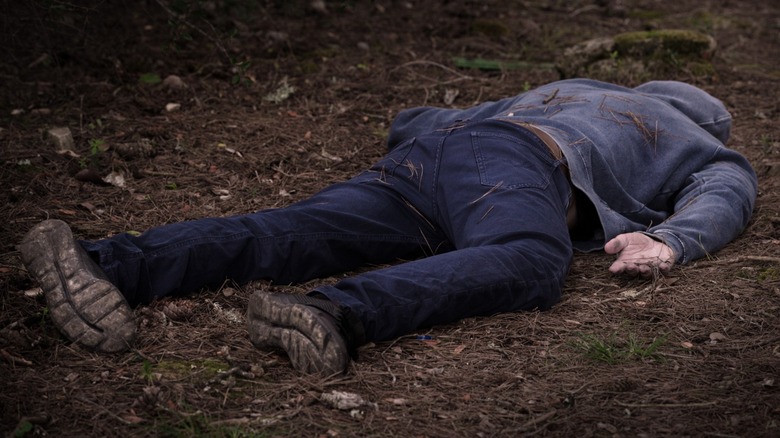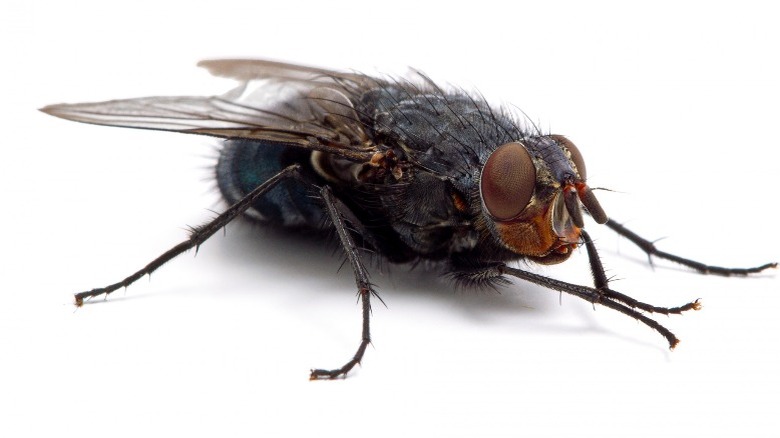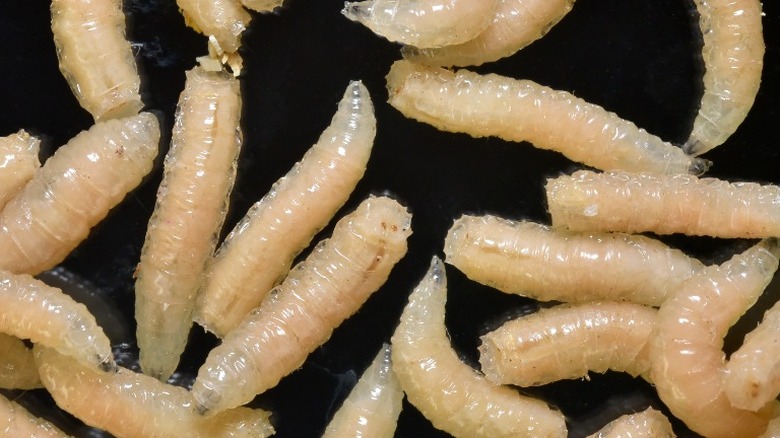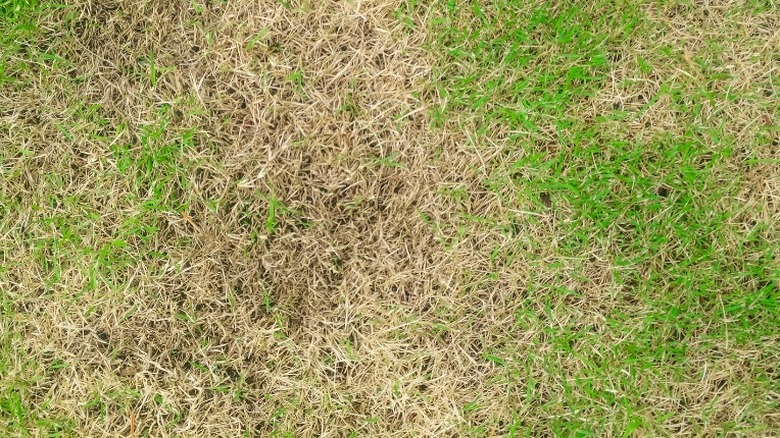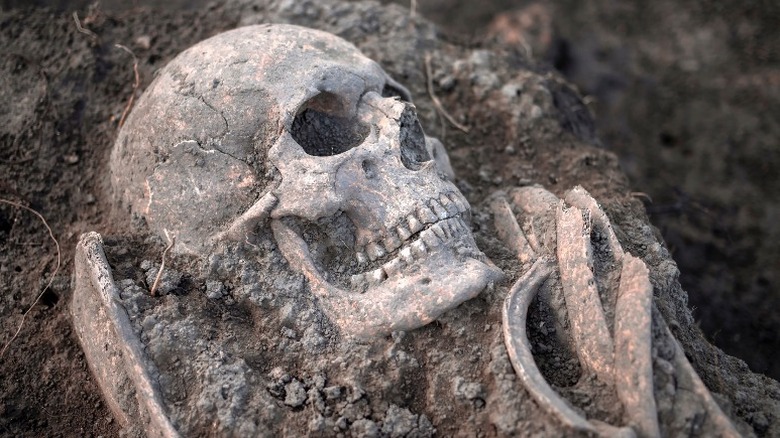What Are The Five Stages Of Decomposition
The human body is a tough machine, with a wide variety of parts that all come together in synchronistic rhythm that at the best of times make it hum like a top. But no matter how well built the machine, nothing will last forever. At some point, one of your vital parts stops working, putting you out of service forever.
The processes your body will undergo from the moment of your death until it has been reclaimed by the earth are as fascinating as they are complex. You'll bloat, expel horrible smelling gases and fluids, and have your flesh fall off. You'll also attract a lot of insects. Like, a lot. In fact, they'll be what keeps you company over the majority of this final adventure your body is about to experience.
No lives are exactly the same. But in death, we are all pretty much alike in how we decompose. This process begins the moment you exhale for the final time. Dead bodies, left alone — perhaps outdoors — will follow the same scientific pattern.
Initial breakdown
When the last breath of life leaves your body, the brain and internal organs shut down. The flow of blood ceases, entering a state of stagnation in your veins, arteries, and vital organs. Without the brain regulating your internal temperature, your body will cool down from its average 98.6 degrees to match the temperature of the environment that you expired in. You won't have the blood flow to the muscles to keep them loose, either. Your muscular system will undergo some quick changes, becoming stiff and rigid. This process, known as rigor mortis, occurs as early as four hours after death, depending on the temperature your body is exposed to (via The Forensics Library).
Within hours, blood will begin to pool at the body's lowest points. The natural bacteria that you hold in your gut begins to eat away at your intestinal lining, while the cells within you begin to die. The process of cellular death involves the cellular walls deteriorating, succumbing to the cellular enzymes that begin to cannibalize them.
All of the above are happening within your body, and aren't observable to the naked eye. As your insides begin the process of decomposition, the blowflies and flesh flies begin to arrive. They lay their eggs on your body (via Bio SoCal).
Bloating
The second stage of your body's decomposition begins about 48 hours later. What your corpse experiences in this phase will be noticeable to anyone paying attention. The bacteria that is inside your body are rapidly multiplying. The life cycle of the bacteria results in various gases being produced, which over time begin to fill up your insides. As the gas has no ready means of escape, they will cause your body to bloat.
The gases build to a point to which they begin to push bodily fluids out of your mouth, anus, and nose. These fluids are more nourishment for the growing number of insects that are beginning to swarm your body. Your skin will rip and tear. Your tongue and eyes will be noticeably swollen, and your skin will begin turning color as the hemoglobin changes pigment (via The Forensics Library).
The gases and fluids that begin to escape from your body at the end of this stage will make you easy to find by scent, as the first odors of putrefaction are readily noticeable. This stage of decomposition will last on average from two to six days, depending upon the environment you happened to die in.
Active decay
Now, your friends and family will begin to notice some real changes in you. Even those in your life whose lack of observational skills made your latest haircut go unnoticed (and uncomplimented) will become fully aware of how different you are looking these days. Your bloated body will quickly deflate, as all the gases and fluids have successfully escaped the inside of your body. A combination of bacteria and insects will begin to rapidly eat away at your flesh. The smells from the compounds produced by the decay will attract even more insects, like a smelly dinner bell.
This fast decay of your body's tissues will give the body a wet feel to it. Your body will also be writhing with maggots now, the larvae from the blowflies and flesh flies that had begun laying their eggs on you days before. This stage of your decomposition ends with the maggots vacating your body (via Bio SoCal).
Your internal organs will begin their journey into decay. These parts of you fall to rot in a certain order, beginning with your intestines, and ending with the prostate or the uterus (via The Forensics Library). Most of the skin has been eaten away or rotted off by the very end of the decay stage, leaving behind the ligaments, muscles, and bones for everyone to see.
Advanced decay
You're now entering a the state of decomposition known as advanced decay, or post decay. For the next two weeks, your body is going to begin to shrink even more, as larger insects arrive for their dinner. Beetles and other scavengers with jaws will tear away at what is left clinging to your bones, ridding your skeleton of the muscles and ligaments that remain.
The horrible way you smelled days ago has subsided, although it might have been replaced with a scent of cheese. This odor, if it's present, is caused by the butyric acid that is now eating away at what the vermin don't devour (via The Forensics Library).
Should you have decided to die on the ground, people will notice that the plant life that is under and around your body has died. The bacteria, gases, and acids that spilled from your body days ago will have taken their toll on the lawn, leaving an unattractive dead spot.
Dry remains
At long last, you reach the last stage of decomposition. On average, you should be at this point within three weeks of your death. Your surroundings and the climate will greatly impact just how long this stage will last.
In the dry stage, all of things that made your body decompose have evaporated away. Your body might still have some dried tissues clinging to it, as well as some dried skin that didn't get eaten away by the beetles. Tougher parts of your insides remain, like the cartilage. These will remain on your bones until they are very slowly eaten as they begin to soften over time. The good news is, you'll still have your hair. Most of it, anyway (via The Forensics Library).
You'll also be free of all weird and unwelcome smells, as your body slowly becomes just another skeleton. Your bones will begin to change color, eventually turning white from the sun bleaching them. At some point, the bones will break down and be absorbed back into the earth. Cycle of life complete.
